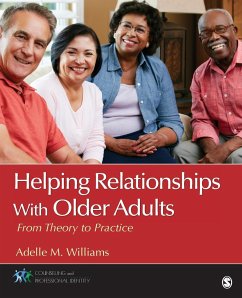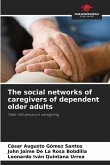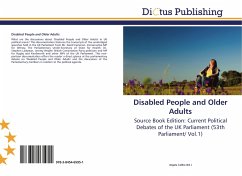- Broschiertes Buch
- Merkliste
- Auf die Merkliste
- Bewerten Bewerten
- Teilen
- Produkt teilen
- Produkterinnerung
- Produkterinnerung
Helping Relationships with Older Adults: From Theory to Practice examines the fundamental theoretical perspectives of the aging process with an emphasis on the healthy aspects of aging. Taking a comprehensive approach, author Adele Williams addresses various therapeutic methods as she highlights the strengths and resiliency of the older population. Exercises and case studies demonstrate key concepts and promote skill development by allowing students to experience the various challenges in the lives of older clients.
Andere Kunden interessierten sich auch für
![Suffering Narratives of Older Adults Suffering Narratives of Older Adults]() Mary Beth Quaranta MorrisseySuffering Narratives of Older Adults65,99 €
Mary Beth Quaranta MorrisseySuffering Narratives of Older Adults65,99 €![Family Issues on Marriage, Divorce, and Older Adults in Japan Family Issues on Marriage, Divorce, and Older Adults in Japan]() Fumie KumagaiFamily Issues on Marriage, Divorce, and Older Adults in Japan38,99 €
Fumie KumagaiFamily Issues on Marriage, Divorce, and Older Adults in Japan38,99 €![Suffering Narratives of Older Adults Suffering Narratives of Older Adults]() Mary Beth MorrisseySuffering Narratives of Older Adults227,99 €
Mary Beth MorrisseySuffering Narratives of Older Adults227,99 €![The social networks of caregivers of dependent older adults The social networks of caregivers of dependent older adults]() César Augusto Gómez SantosThe social networks of caregivers of dependent older adults40,99 €
César Augusto Gómez SantosThe social networks of caregivers of dependent older adults40,99 €![Disabled People and Older Adults Disabled People and Older Adults]() Disabled People and Older Adults22,99 €
Disabled People and Older Adults22,99 €![Family Issues on Marriage, Divorce, and Older Adults in Japan Family Issues on Marriage, Divorce, and Older Adults in Japan]() Fumie KumagaiFamily Issues on Marriage, Divorce, and Older Adults in Japan38,99 €
Fumie KumagaiFamily Issues on Marriage, Divorce, and Older Adults in Japan38,99 €![Older Adults and Computers Older Adults and Computers]() Bonny BhattacharjeeOlder Adults and Computers51,99 €
Bonny BhattacharjeeOlder Adults and Computers51,99 €-
-
-
Helping Relationships with Older Adults: From Theory to Practice examines the fundamental theoretical perspectives of the aging process with an emphasis on the healthy aspects of aging. Taking a comprehensive approach, author Adele Williams addresses various therapeutic methods as she highlights the strengths and resiliency of the older population. Exercises and case studies demonstrate key concepts and promote skill development by allowing students to experience the various challenges in the lives of older clients.
Hinweis: Dieser Artikel kann nur an eine deutsche Lieferadresse ausgeliefert werden.
Hinweis: Dieser Artikel kann nur an eine deutsche Lieferadresse ausgeliefert werden.
Produktdetails
- Produktdetails
- Verlag: Sage Publications, Inc
- Seitenzahl: 408
- Erscheinungstermin: 22. Juli 2016
- Englisch
- Abmessung: 235mm x 191mm x 22mm
- Gewicht: 759g
- ISBN-13: 9781483344584
- ISBN-10: 1483344584
- Artikelnr.: 44435052
- Herstellerkennzeichnung
- Libri GmbH
- Europaallee 1
- 36244 Bad Hersfeld
- gpsr@libri.de
- Verlag: Sage Publications, Inc
- Seitenzahl: 408
- Erscheinungstermin: 22. Juli 2016
- Englisch
- Abmessung: 235mm x 191mm x 22mm
- Gewicht: 759g
- ISBN-13: 9781483344584
- ISBN-10: 1483344584
- Artikelnr.: 44435052
- Herstellerkennzeichnung
- Libri GmbH
- Europaallee 1
- 36244 Bad Hersfeld
- gpsr@libri.de
Dr. Adelle M. Williams is a native of Baltimore, Maryland, and currently resides with her family in Pittsburgh, Pennsylvania. She earned her PhD and Master's in Education in Rehabilitation Counseling and her undergraduate degree in Sociology from the University of Pittsburgh. She later obtained a Master's in Business Administration from Robert Morris College. Throughout her academic pursuits she has focused on aging and aging-related issues. Currently, Dr. Williams is the Gerontology Coordinator and Professor within the Public Health and Social Work department within Slippery Rock University of Pennsylvania since June, 2015. She teaches graduate counseling courses and undergraduate gerontology courses and is described as a dynamic professor who inspires students to advocate for the interests of our elders. Prior to this appointment, Dr. Williams was a Professor and Gerontology Coordinator within the Clinical Mental Health Counseling Program within the Counseling and Development and responsible for the newly created Aging specialization. Other positions held within the University include Professor and Gerontology Coordinator within the Health and Safety Management department, Assistant to the Dean for the College of Health, Environment and Science, Director of the Health Services Administration Program, Co-developer of the Long Term Care Administration specialization, Adjunct Professor within the Department of Allied Health and Faculty Liaison to Queen Margaret College in Edinburgh, Scotland. Dr. Williams' research interests include aging, health and mental health, cultural diversity, women's issues and administration. She has published articles in the Gerontologist, Protective Services Quarterly, The Afrocentric Scholar, The Journal of Allied Health, American Journal of Occupational Therapy, The Journal of Long Term Care Administration, Physical Therapy Education. The Journal of Health Administration Education, and the Pennsylvania Journal of Health, Physical Education, Recreation and Dance. Dr. Williams' has presented at the local, state, national and international levels. She has been invited to present and invited to deliver the keynote address at several commencement ceremonies. She has attained grants and managed the grant application process. Dr. Williams has conducted many program reviews and interviewed by the media. Clinical positions in the private sector included clinician, clinical supervisor, admissions administration and research program coordinator within the Geriatric Psychiatry and Behavioral Neurology Unit of Western Psychiatric Institute and Clinic. She conducted individual, family and group sessions, lead reminiscence groups, interpreted various assessments, and connected older adults with community services while operating within a multidisciplinary team. She also served in a consultant capacity for the Center for Aging and Research Program Director at the Mercy Hospital of Pittsburgh within the Geriatrics Division. Her clinical, research and administrative experiences has proven valuable in teaching students to appreciate the challenges and opportunities inherent in the aging process and professional work with older adults.
Section I. Overview of the Aging Process, Aging Theories, Positive Aging,
and the Helping Process
Chapter 1: Introduction
Aging
Biological Theories Associated With Aging
Physical Changes That Accompany Aging
Cognitive Changes That Accompany Aging
Chapter 2: Historical Perspectives and Changing Attitudes Toward Older
Adults
Perceptions of Growing Older and Societal Influences
Historical Aspects of Aging
Aging of the Baby Boomer Generation
Aging and Mental Health
Rethinking the Value of Aging
Chapter 3: Characteristics of Positive Older Adults and the Helping Process
Successful Aging and Mental Wellness
Positive Aging Characteristics
Counseling Older Adults
Attributes of Successful Practitioners
Part II. Common Issues and Problematic Behaviors Experienced by Older
Adults
Chapter 4: Health Challenges That Impact the Well-Being of Older Adults
Impact of Age-Related Diseases on Activities of Daily Living
Cardiovascular Diseases
Diabetes
Cancer
Arthritis
Osteoporosis
Falls
Vision Disorders
Cerebrovascular Disease
HIV/AIDS
Chapter 5: Challenging Conditions Experienced by Older Adults
Alzheimer's Disease
Depression
Anxiety
Substance Abuse
Elder Abuse
Chapter 6: Family Issues and Support Systems
Caregiving
Grandparenting
Support Systems
Chapter 7: Loss and Its Effect on Older Adults
Loss
Divorce
Widowhood
Dying and Death
Chapter 8: Opportunities in Later Life
Psychosocial Theories Related to Engagement
Employment
Retirement
Leisure
Retirement
Part III: Professional Practice in Working With Older Clients
Chapter 9: Skills, Attitudes, and Knowledge of Effective Practitioners
Counselor Preparation and Development
Strategies to Use in Counseling Older Adults
Chapter 10: Professional Practice With Goals for Older Adults
Psychosocial Interventions
Stages of the Helping Relationship
Issues Brought to the Helping Relationship
Dealing With Uncertainty
Terminal Illness
Death and Dying
Chapter 11: Therapeutic Approaches and Appropriateness for Older Clients
Problem Solving Therapy
Brief Dynamic Therapy
Behavioral Therapy
Cognitive Therapy
Cognitive-Behavioral Therapy
Integrative Approach
Strengths-Based Approach
Reminiscence Therapy and Life Review
Family Systems Approach
Reality Orientation
Chapter 12: Future Trends
Positive Aging
Health Care
Employment and Retirement
Counseling Considerations
and the Helping Process
Chapter 1: Introduction
Aging
Biological Theories Associated With Aging
Physical Changes That Accompany Aging
Cognitive Changes That Accompany Aging
Chapter 2: Historical Perspectives and Changing Attitudes Toward Older
Adults
Perceptions of Growing Older and Societal Influences
Historical Aspects of Aging
Aging of the Baby Boomer Generation
Aging and Mental Health
Rethinking the Value of Aging
Chapter 3: Characteristics of Positive Older Adults and the Helping Process
Successful Aging and Mental Wellness
Positive Aging Characteristics
Counseling Older Adults
Attributes of Successful Practitioners
Part II. Common Issues and Problematic Behaviors Experienced by Older
Adults
Chapter 4: Health Challenges That Impact the Well-Being of Older Adults
Impact of Age-Related Diseases on Activities of Daily Living
Cardiovascular Diseases
Diabetes
Cancer
Arthritis
Osteoporosis
Falls
Vision Disorders
Cerebrovascular Disease
HIV/AIDS
Chapter 5: Challenging Conditions Experienced by Older Adults
Alzheimer's Disease
Depression
Anxiety
Substance Abuse
Elder Abuse
Chapter 6: Family Issues and Support Systems
Caregiving
Grandparenting
Support Systems
Chapter 7: Loss and Its Effect on Older Adults
Loss
Divorce
Widowhood
Dying and Death
Chapter 8: Opportunities in Later Life
Psychosocial Theories Related to Engagement
Employment
Retirement
Leisure
Retirement
Part III: Professional Practice in Working With Older Clients
Chapter 9: Skills, Attitudes, and Knowledge of Effective Practitioners
Counselor Preparation and Development
Strategies to Use in Counseling Older Adults
Chapter 10: Professional Practice With Goals for Older Adults
Psychosocial Interventions
Stages of the Helping Relationship
Issues Brought to the Helping Relationship
Dealing With Uncertainty
Terminal Illness
Death and Dying
Chapter 11: Therapeutic Approaches and Appropriateness for Older Clients
Problem Solving Therapy
Brief Dynamic Therapy
Behavioral Therapy
Cognitive Therapy
Cognitive-Behavioral Therapy
Integrative Approach
Strengths-Based Approach
Reminiscence Therapy and Life Review
Family Systems Approach
Reality Orientation
Chapter 12: Future Trends
Positive Aging
Health Care
Employment and Retirement
Counseling Considerations
Section I. Overview of the Aging Process, Aging Theories, Positive Aging,
and the Helping Process
Chapter 1: Introduction
Aging
Biological Theories Associated With Aging
Physical Changes That Accompany Aging
Cognitive Changes That Accompany Aging
Chapter 2: Historical Perspectives and Changing Attitudes Toward Older
Adults
Perceptions of Growing Older and Societal Influences
Historical Aspects of Aging
Aging of the Baby Boomer Generation
Aging and Mental Health
Rethinking the Value of Aging
Chapter 3: Characteristics of Positive Older Adults and the Helping Process
Successful Aging and Mental Wellness
Positive Aging Characteristics
Counseling Older Adults
Attributes of Successful Practitioners
Part II. Common Issues and Problematic Behaviors Experienced by Older
Adults
Chapter 4: Health Challenges That Impact the Well-Being of Older Adults
Impact of Age-Related Diseases on Activities of Daily Living
Cardiovascular Diseases
Diabetes
Cancer
Arthritis
Osteoporosis
Falls
Vision Disorders
Cerebrovascular Disease
HIV/AIDS
Chapter 5: Challenging Conditions Experienced by Older Adults
Alzheimer's Disease
Depression
Anxiety
Substance Abuse
Elder Abuse
Chapter 6: Family Issues and Support Systems
Caregiving
Grandparenting
Support Systems
Chapter 7: Loss and Its Effect on Older Adults
Loss
Divorce
Widowhood
Dying and Death
Chapter 8: Opportunities in Later Life
Psychosocial Theories Related to Engagement
Employment
Retirement
Leisure
Retirement
Part III: Professional Practice in Working With Older Clients
Chapter 9: Skills, Attitudes, and Knowledge of Effective Practitioners
Counselor Preparation and Development
Strategies to Use in Counseling Older Adults
Chapter 10: Professional Practice With Goals for Older Adults
Psychosocial Interventions
Stages of the Helping Relationship
Issues Brought to the Helping Relationship
Dealing With Uncertainty
Terminal Illness
Death and Dying
Chapter 11: Therapeutic Approaches and Appropriateness for Older Clients
Problem Solving Therapy
Brief Dynamic Therapy
Behavioral Therapy
Cognitive Therapy
Cognitive-Behavioral Therapy
Integrative Approach
Strengths-Based Approach
Reminiscence Therapy and Life Review
Family Systems Approach
Reality Orientation
Chapter 12: Future Trends
Positive Aging
Health Care
Employment and Retirement
Counseling Considerations
and the Helping Process
Chapter 1: Introduction
Aging
Biological Theories Associated With Aging
Physical Changes That Accompany Aging
Cognitive Changes That Accompany Aging
Chapter 2: Historical Perspectives and Changing Attitudes Toward Older
Adults
Perceptions of Growing Older and Societal Influences
Historical Aspects of Aging
Aging of the Baby Boomer Generation
Aging and Mental Health
Rethinking the Value of Aging
Chapter 3: Characteristics of Positive Older Adults and the Helping Process
Successful Aging and Mental Wellness
Positive Aging Characteristics
Counseling Older Adults
Attributes of Successful Practitioners
Part II. Common Issues and Problematic Behaviors Experienced by Older
Adults
Chapter 4: Health Challenges That Impact the Well-Being of Older Adults
Impact of Age-Related Diseases on Activities of Daily Living
Cardiovascular Diseases
Diabetes
Cancer
Arthritis
Osteoporosis
Falls
Vision Disorders
Cerebrovascular Disease
HIV/AIDS
Chapter 5: Challenging Conditions Experienced by Older Adults
Alzheimer's Disease
Depression
Anxiety
Substance Abuse
Elder Abuse
Chapter 6: Family Issues and Support Systems
Caregiving
Grandparenting
Support Systems
Chapter 7: Loss and Its Effect on Older Adults
Loss
Divorce
Widowhood
Dying and Death
Chapter 8: Opportunities in Later Life
Psychosocial Theories Related to Engagement
Employment
Retirement
Leisure
Retirement
Part III: Professional Practice in Working With Older Clients
Chapter 9: Skills, Attitudes, and Knowledge of Effective Practitioners
Counselor Preparation and Development
Strategies to Use in Counseling Older Adults
Chapter 10: Professional Practice With Goals for Older Adults
Psychosocial Interventions
Stages of the Helping Relationship
Issues Brought to the Helping Relationship
Dealing With Uncertainty
Terminal Illness
Death and Dying
Chapter 11: Therapeutic Approaches and Appropriateness for Older Clients
Problem Solving Therapy
Brief Dynamic Therapy
Behavioral Therapy
Cognitive Therapy
Cognitive-Behavioral Therapy
Integrative Approach
Strengths-Based Approach
Reminiscence Therapy and Life Review
Family Systems Approach
Reality Orientation
Chapter 12: Future Trends
Positive Aging
Health Care
Employment and Retirement
Counseling Considerations








